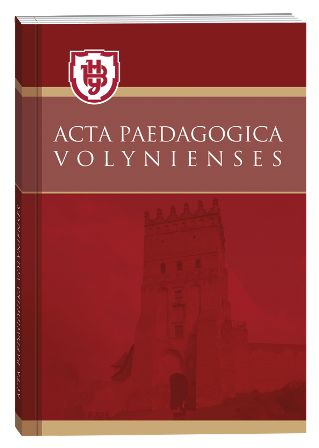ORGANIZATION OF EDUCATIONAL ACTIVITIES OF PRESCHOOL CHILDREN IN THE PROCESS OF LEARNING A FOREIGN LANGUAGE
DOI:
https://doi.org/10.32782/apv/2023.1.6Keywords:
game orientation, organization of educational activities, interactive methods, speech activityAbstract
The article reveals the peculiarities of the organization of educational activities of children of preschool and primary school age when learning English. Pedagogical conditions that ensure the effectiveness of fostering interest in learning a foreign language in preschool children are defined and substantiated, namely: the teacher takes into account the age and individual characteristics of preschoolers and ensures a differentiated approach in the process of teaching children foreign languages; provision of a communicative focus on the process of teaching children foreign languages; a combination of traditional and non-traditional forms, game methods of organizing children’s educational activities; positive reinforcement by the teacher of the child’s success in learning foreign languages. The importance and necessity of teaching preschool children a foreign language is analyzed, the goals of learning are defined, the organization and some methodological aspects of teaching children in preschool education institutions are presented. The advantages of early learning of a foreign language for preschoolers are characterized, because at an early stage, a foreign language is called and should solve a more important goal than just the acquisition of certain practical skills and abilities. The role of a foreign language at an early stage of education is especially invaluable for the comprehensive development of children. Language for a child is primarily a means of communication, cognition and education. Therefore, the development of the child’s personality through the means of a foreign language should be the overarching task at an early stage of education. The main tasks of an educator with the right to teach a foreign language are described, which promotes children’s interest in learning languages as a means of communication and, at the same time, as an important component of their preparation for school, since it, as a rule, contributes to the development of personality and life competence in preschool childhood. The level of professional training of the teacher, as well as theoretical, methodical and practical skills, will depend, first of all, on the interest of preschoolers in languages, their desire to master it and, in general, their communicative competence.
References
Бабенко Н. Англійська мова для дошкільнят та першокласників. Х. : Вид. група «Основа». 2008. 144 с.
Воронка Г. С. Англійська мова для дітей. Книга для вчителів та батьків. К.: «Логос». 2001. 96 с.
Марчій-Дмитраш Т. М. Навчання іноземної мови дітей дошкільного віку. Івано-Франківськ: Видавець Кушнір Г. М. 2015. 64 с.
Трофаїла Н. Д. Методика навчання дітей іноземної мови. Умань : ВПЦ «Візаві». 2019. 131 с.







